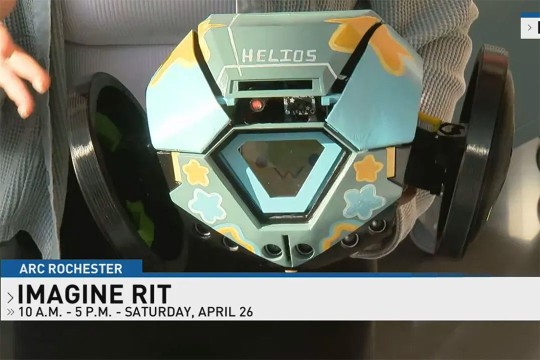RIT ranks No. 36 among top ‘green’ colleges by Princeton Review
Solar energy use, purchase of renewable energy credits among factors in Top 50 ranking
A. Sue Weisler
RIT’s solar energy use across the university’s main campus and the purchase of renewable energy credits for all of the electricity the school buys were among the leading factors in achieving its rating.
For the 11th consecutive year, Rochester Institute of Technology has been named one of the greenest universities by The Princeton Review.
The rankings are featured in The Princeton Review Guide to Green Colleges: 2022 Edition. RIT is ranked No. 36 this year out of the 416 schools profiled, earning the university a spot on the publication’s even more exclusive “Top 50 Green Colleges” list.
In the guide’s profile, RIT is commended for being on “the cutting edge of innovation,” achieving a “Green Rating” score of 97 out of a possible 99—matching the university’s highest rating ever.
The Princeton Review chose the 416 schools it profiles in the guide based on a survey the company conducted in 2019-2020 of hundreds of administrators about their institutions’ sustainability-related policies, practices, and programs. Survey topics ranged from academic offerings and campus initiatives to career preparation for “green” jobs.
RIT’s solar energy use across the university’s main campus and the purchase of renewable energy credits for all of the electricity the school buys were among the leading factors in achieving its rating, according to Enid Cardinal, senior advisor to the president for strategic planning and sustainability.
The university’s second 2MW solar array is helping move the campus closer to its commitment toward carbon neutrality by 2030. RIT also is recognized for founding Golisano Institute for Sustainability and serving as the headquarters for the New York State Pollution Prevention Institute.
“We strongly recommend RIT to students who want to study and live at a green college,” said Rob Franek, The Princeton Review’s editor-in-chief.
Franek noted that The Princeton Review has seen a high level of interest among college applicants and their parents in colleges with green practices, programs, and offerings. Seventy-five percent of the 12,845 respondents (college-bound teens and parents) to The Princeton Review’s 2020 College Hopes & Worries Survey said that having information about a college’s commitment to the environment would affect their (or their child’s) decision to apply to or attend a school.
The school profiles in The Princeton Review Guide to Green Colleges include “Green Facts” sections detailing such matters as the availability of transportation alternatives on campus and the percentage of the college food budget spent on local/organic food. The profiles also provide information about the schools’ admission requirements, cost, financial aid, and student body demographics.
The guide chose colleges based on “Green Rating” scores (from 60 to 99) that the company tallied from 695 colleges using data from its 2019-2020 survey of school administrators. More than 25 data points were weighted in the assessment. Schools with scores of 80 or higher made it into the guide.
The Princeton Review developed the Top 50 ranking list using data from the institutional survey for its Green Rating and its surveys of students attending the colleges. Ten data points from the survey factored into the assessment, including student ratings of how sustainability issues influenced their education and life on campus; administration and student support for environmental awareness and conservation efforts; and the visibility and impact of student environmental groups.
The complete guide can be downloaded from The Princeton Review website.












